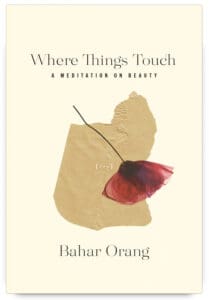Pondering Beauty During a Pandemic
Book Review by Carole Mertz
Where Things Touch by Bahar Orang, Book*hug Press, 2020, ISBN 9781771665698, 114 pages, $20.00
Reading Orang’s meditations on beauty in Where Things Touch, I encountered a great deal of inner resistance. Beauty for me is an experience. I don’t want to be told why an object is beautiful, so I thought.

To ponder beauty during this pandemic, is difficult, when so much of what’s happening is ugly. People are turned inside out wondering how to cope. Friends are dying within hospitals and senior facilities without seeing their loved ones and without understanding their beloveds’ absences.
Yet just in these times, we may have greater urgency to consider how and where things touch, as Orang does. We may need to think harder about how we share ourselves or, of necessity, isolate ourselves, and consider where beauty can provide solace.
Orang wrote her meditations during a period of budding love for a romantic figure in her life and during her intensive medical training. Perhaps she committed to considerations of beauty as a way to foster personal health during the stresses she experienced. Beside sick beds, she surely witnessed blood, fear, and death.
“Sometimes beauty is restraint,” Orang writes. “Other times, beauty is the fruit of that restraint: releasing to sensation after the wait, celebrating freely and without shame, all the sensual details of our daily lives” (p.75).
In Where Things Touch she does just that, celebrating the sensual details, and more. On p. 63 she considers the fragility of things and concludes language is the most fragile of all. “All our essays and poems,” she writes, “are made up of echoes and reconfigurations of each other.” Framed within parentheses, she records this fragment:
I believe we’ve disallowed description for too long, as
though its gestures and shapes, its associative nature, its generous personality, how it comes to be by way of some other person or art or thing, is not original enough, not utterative enough. (p. 64)
Here she presents herself in open conversation with her own creative activity. This reminds me of Natalie Goldberg’s thought, that writing itself holds tremendous energy: “If you find a reason for it, any reason, it seems that rather than negate the act of writing it makes you burn deeper and glow clearer on the page” (p. 114, Writing Down the Bones, 1986).
Continuing, Orang ponders: “Is it frustrating or freeing or both to imagine we might never truly articulate the meaning of anything, that we only ever write in synonym, all our poems somewhere slightly else…” (p. 65). Like most authors, she acknowledges that writers can only approximate the clearest recording of their intent, contenting themselves with only the pursuit of clarity, noble and pleasurable in itself. She further discusses the importance of the hermeneutics of affirmation “for receptivity, for curiosity, for awe toward the beauty of all the human, animal, and mineral worlds. And a hermeneutics of suspicion to learn skills for discerning all that threatens those worlds” (p. 103).
Evoking another expansive experience, Orang invites us to view her city, presumably Toronto, as she is “standing on the balcony, the tiniest balcony in the whole city, a balcony that feels nonetheless like a castle…the outside air has a new texture now, something balmy, something falling away, and I’m granted meaning, or is it pleasure, a distance and a closeness at once, I’m both lover and beloved…” (p. 45-46). Here again I’m reminded of Goldberg. In her chapter “Every Monday,” Goldberg tells us we are a part of everything: “There are many realities. We should remember this when we get too caught in being concerned about the way the rest of the world lives…There is just our lives and how we want to write and how we want to touch the rain, the table, the music, paper cups and pine trees” (p. 118, Writing Down the Bones, 1986).
Orang shows us how we are a part of this “everything.” She shows us the many ways we can allow the world to touch us and the ways we can reciprocate.
So I receive Orang’s contemplations as a call to experience more fully the moments in my days, moment by moment. Her lines may also require that I acknowledge beauty as a kind of shattering, as Louise Glueck did, in her poem “The Red Poppy.” Did you permit yourself to open? the poet asked.

My aforementioned resistances fall away. Perhaps beauty, within these trying times, is indeed encountered in spite of pain. Before my eyes I see the global Covid-19 image itself, painted in cranberry reds. Perhaps beauty resides even within the ugly.
Finally, Where Things Touch is somewhat unusual in its organization, with its collection of short fragments following one upon the other. Yet the structure works well due to Orang’s steady commitment to her theme. Her various affirmations present as aphorisms we do well to consider, perhaps mentally creating and adding our own to the collection.

About the Author – Carole Mertz
Carole Mertz is book review editor at Dreamers Creative Writing. Carole’s essays and poems have appeared in literary journals in Canada and U.S., and in African, U.K. and Indian journals. She served as judge for the 2020 Poets and Patrons of Illinois International Poetry Contest and serves on the Prize Nomination Committee of The Ekphrastic Review. Her full-length poetry collection Color and Line, 2021, is available at Amazon.com: Color and Line (9781952326806): Mertz, Carole: Books
Did you like this Book Review on Where Things Touch? Then you might also like:
Smallwood Offers Style and Intriguing Content
Shapes of Native Nonfiction
Layered Poetry in heft by Doyali Islam
Sam sax’s Madness Under Examination
Take a Does of Michael Pollan’s Latest Batch, How to Change Your Mind
Through, Not Around: Stories of Infertility and Pregnancy Loss
To check out all the book reviews available on Dreamers, visit our book review section!

Dreamers Writing Prompt Generator
Experience the power of simplicity with our unique writing prompt generator. Designed for writers who crave spontaneity and surprise, our tool delivers one meticulously crafted prompt at a time.

Top 25 Most Popular Manga Right Now
If you’re searching for the most popular Manga right now, this top 25 list is the ideal starting point, whether a beginner or enthusiast.